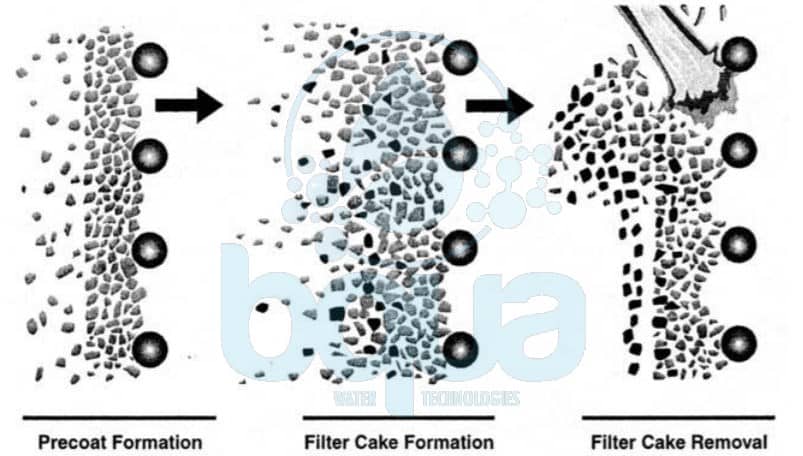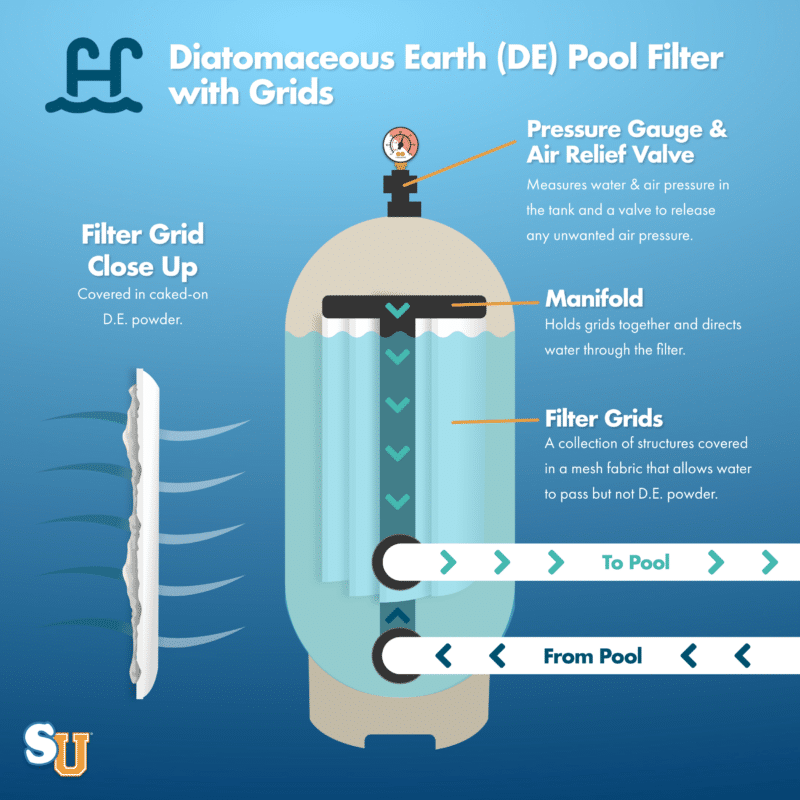Diatomaceous Planet Filtering: A Natural Solution for Superior Water Filtration

Diatomaceous Earth (DE) filtering has arised as an engaging method for boosting water purification, using the unique residential properties of fossilized diatoms. As worries over water top quality magnify, recognizing the advantages and useful applications of DE filtering system becomes significantly appropriate.

What Is Diatomaceous Planet?
Diatomaceous earth (DE) is a naturally taking place, soft, stratified rock that is composed primarily of the fossilized remains of tiny aquatic microorganisms referred to as diatoms. These single-celled algae possess a special, silica-based cell wall that adds to the distinct residential or commercial properties of DE. The rock is porous and normally light, allowing it to soak up various compounds successfully.

Due to its high porosity and absorptive ability, DE serves countless applications, including its usage in farming, pest control, and, especially, water purification. The effectiveness of diatomaceous earth in filtering system is associated to its ability to catch and eliminate contaminations from water, making it a progressively preferred option amongst those looking for all-natural filtering remedies. Its environmentally friendly nature and versatility further enhance its charm across numerous industries.
Exactly How Diatomaceous Planet Filtering Functions
The special structure of diatomaceous earth (DE) allows it to operate as an efficient purification medium in water filtration systems (diatomaceous earth filtering). Made up of the fossilized remains of tiny, water microorganisms called diatoms, DE has a very absorptive and porous nature. This elaborate framework allows DE to trap contaminations and impurities as water flows with it, effectively removing particles as tiny as 1 micron
When water is travelled through a DE filter, the liquid experiences a network of microscopic pores that capture suspended solids, bacteria, and other unwanted products. The filtering procedure happens because of both mechanical and electrostatic communications, where bigger fragments are literally trapped within the DE's matrix, while smaller sized fragments might follow the surface as a result of charged communications.
In addition, DE can be made use of along with other filtration approaches to improve total performance. As water remains to flow through the DE layer, it progressively comes to be more clear and cleaner, showcasing the tool's capacity to boost water quality without the demand for severe chemicals. This natural filtering process highlights diatomaceous earth's role as a reliable and lasting option for water purification.
Benefits of Diatomaceous Planet Filtering
Effectiveness in water purification is significantly improved through the use of diatomaceous planet (DE) filtering, using various advantages that make it a preferred selection for several applications. One of the main advantages of DE filtering is its ability to get rid of a vast array of impurities, consisting of tiny organisms, sediments, and also specific chemicals. This capability ensures that the water detoxified through this approach is not only clean yet likewise safe for intake.
Additionally, DE filters have a high circulation rate, which permits quicker filtration compared to traditional techniques. This particular is especially beneficial for massive procedures such as local water treatment plants or pool. The use of DE additionally minimizes pop over to this site the demand for rough chemical additives, promoting an extra environmentally friendly technique to water purification.
Additionally, DE filtering system systems are fairly very easy to maintain, calling for less frequent replacement than various other purification media. The natural beginning of diatomaceous earth adds to its sustainability, making it an eco-conscious choice. In general, the mix of effectiveness, performance, and environmental advantages placements diatomaceous planet filtering system as a leading option in the world of water purification.
Comparison With Standard Water Filters
When reviewing water filtration methods, diatomaceous earth filtering attracts attention in contrast to conventional water filters. Typical water filters, such as activated carbon or ceramic filters, primarily concentrate on getting rid of pollutants with adsorption or physical obstacles. While these approaches work for specific pollutants, they might not capture smaller particles, germs, or infections as successfully as diatomaceous earth (DE) filters.
Diatomaceous planet filtering system makes use of the distinct framework of diatomite, composed of tiny, permeable fossilized algae. This allows DE filters to trap fragments as small as try this site 1 micron, supplying remarkable purification capabilities. In addition, DE filters can handle larger volumes of water without considerable stress loss, making them ideal for both industrial and household applications.
Additionally, diatomaceous planet is a lasting and all-natural material, presenting less environmental issues compared to some artificial filter media. On the other hand, conventional filters commonly require regular replacement and disposal, leading to increased waste.
Applications and Use Situations
Diatomaceous earth (DE) filtering system has a varied variety of applications across various industries as a result of its efficient purification capabilities. Among the most famous uses DE is in the food and beverage industry, where it works as a purification tool for juice, beer, and a glass of wine manufacturing. Its permeable framework efficiently eliminates contaminations, making certain a clear and tasty last item.
In the realm of swimming pool maintenance, DE filters are favored for their capacity to catch fine fragments, providing remarkable water clarity compared to traditional sand filters. Additionally, DE is utilized in community water treatment facilities, where it assists in the elimination of put check on hold solids, microorganisms, and other contaminants, adding to secure drinking water.

Beyond water filtration, diatomaceous planet finds applications in the farming sector as a natural chemical and soil modification, advertising healthier plants while decreasing chemical usage. Its absorptive buildings make it useful in numerous commercial procedures, consisting of oil spill clean-ups and as a filler in building and construction products. Generally, the flexibility of diatomaceous earth filtering positions it as a beneficial option for enhancing water top quality throughout multiple domain names.
Final Thought
Diatomaceous planet filtering represents a efficient and lasting method for water purification. As understanding of water top quality issues grows, the fostering of diatomaceous earth filters in different applications is likely to raise, adding to boosted public health and eco-friendly preservation.
Diatomaceous Planet (DE) filtering system has emerged as an engaging method for improving water purification, using the one-of-a-kind residential or commercial properties of fossilized diatoms. As water continues to move via the DE layer, it progressively comes to be more clear and cleaner, showcasing the tool's ability to boost water top quality without the demand for harsh chemicals.Efficiency in water filtration is substantially boosted via the usage of diatomaceous planet (DE) filtering, supplying countless advantages that make it a preferred selection for many applications.When assessing water purification methods, diatomaceous earth filtering system stands out in contrast to traditional water filters. Typical water filters, such as triggered carbon or ceramic filters, primarily focus on getting rid of impurities with adsorption or physical barriers.